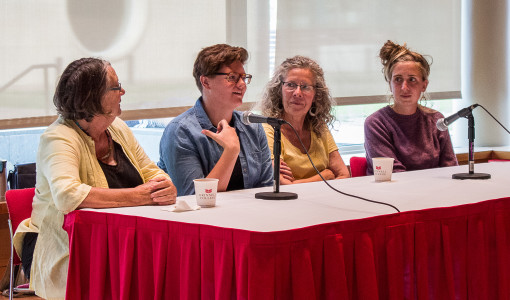
Lily Bohlke
bohlkeli@grinnell.edu
“The face of the farmer is male,” said Denise O’Brien, farmer and community organizer from Atlantic, Iowa at a panel discussion at 4 p.m. this past Wednesday. For the discussion, O’Brien was with writer and farmer Ash Bruxvoort, organizer Carmen Black and local farmer Susan Jutz. Together, the five women discussed the joys and challenges of being a female farmer in Iowa.
According to Bruxvoort, the idea of women in agricultural careers is becoming more prevalent, although there are definitely still challenges to be faced.
“On many of the farms I’ve worked on I would say three-fourths of the apprentices have been women,” Bruxvoort said.
Although the field is quickly becoming populated with women, there are still many struggles to be faced. Black, a beginning farmer and regional organizer with Real Food Challenge, said that she feels lucky to farm where she knows her neighbors, although she recognizes that if these older men did not know her, she might not feel as welcome in a local agricultural community.
“I feel respected and appreciated by these men because I already know them,” Black said.
According to Bruxvoort, many women farmers are taken less seriously in their profession simply because they are women.
Echoing the sentiment of her fellow speakers, Jutz claimed that it has taken her neighborhood 20 years to accept her as the “farmer of the family.”
Black has had similar experiences with men in her hometown.
“I ran into someone I went to high school with and told him I was farming. He looked at my finger and said, ‘Who did you marry to start farming?’ I was angry, but I also thought it was funny because I am the one making this choice,” Black said.
Because of this “male face” in the agricultural community, there is a pressure for women farmers to “overeducate” themselves according to O’Brien.
“When you go into a feed store or a hardware store, sometimes they will ask ‘Are you sure you know what your husband needs?’ It’s this attachment to a male figure, making a woman less of an expert,” O’Brien said.
When the conversation turned to policy, Jutz acknowledged its importance, but suggested that it would not change people’s attitudes. She believes that poor attitudes are the main problem women in agriculture face today.
“The [U.S. Department of Agriculture (USDA)] has made things possible for me to do as a farmer and as a women,” Jutz said, “but when I went to get a part for my broken tiller, I went in with a parts list because that is what I have to do. Other farmers surely did not come in with their parts list.”
In Iowa, women in agriculture are considered a minority and qualify as socially disadvantaged farmers, according to the USDA.
Bruxvoort said that women are not the only group that relies upon farm policy. Due to the corporate structure and profit-seeking model of agribusiness, medium-sized farmers working for agribusinesses are not paid fair prices.
Bruxvoort feels that policy needs to be modified to favor these medium-sized farmers that agribusiness takes advantage of, including her father.
“My dad is definitely going to lose money farming this year,” Bruxvoort said. “I am scared for my dad, for my family and for the future of farming in Iowa.”
Bruxvoort reflected in conclusion that she hoped the food industry would become more oriented towards producing healthy food.
“Our food system is not focused on health or nutrition,” Bruxvoort said. “We’re subsidizing obesity and corn syrup, and it’s not right.”



















































